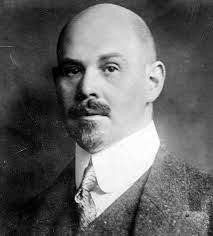 |
Rathenau, Russia, and Rapallo Author(s): Robert Himmer |
“The Treaty of Rapallo, concluded between Soviet Russia and the Weimar Republic on April 16, 1922, has been interpreted by Western historians as a logical result of the process of the reestablishment of the close economic ties which Germany and Russia had shared before the First World War. [...] Rapallo, forced upon Rathenau as it was, was never intended by him as more than a temporary alignment, nor could he abandon economic ambitions in Russia permanently. "We have concluded our peace," he stated shortly before his death, "not with a system, but with a people, and we have concluded it with the men who at this moment represent this people." The "full transformation" of Russia toward capitalism, he believed, continued and would yet create great opportunities for Germany. The notion that the logic of the only capitalist economic reality would compel the Soviets to complete the "full transformation" persisted as the dominant attitude of the German business community toward Russia until at least 1925 and caused the Germans to continue to press for the opening of Russia to German commercial penetration, a goal which contributed to persistent mistrust and instability in German Soviet relations. It could hardly be otherwise when, as Leonid Krasin noted scarcely four months after Rapallo, "the ruling circles of Germany continue to regard Russia ... as an object for capitalist exploitation, as a colony, as a country of muzhiks." The treaty Rathenau had signed at Rapallo, however, had helped make the muzhiks even better able to withstand the forces he represented.
“Rapalski sporazum, zaključen između Sovjetske Rusije i Vajmarske republike 16. aprila 1922. je od strane zapadnih istoričara tumačen kao logični rezultat procesa ponovnog uspostavljanja bliskih ekonomskih veza koje su Nemačka i Rusija imale pre Prvog svetskog rata.[...] Rapalo, nametnut za vreme Ratenaua, znajući kakav je on bio, za njega nikad nije ni bio više od privremenog poravnanja, niti je on mogao da trajnije napusti ekonomske ambicije Rusije. “Zaključili smo naš mir”, rekao je on neposredno pre smrti, “ne sa sistemom, ali sa ljudima, zaključili smo ga sa čovekom koji u ovom trenutku predstavlja te ljude.” Puni preobražaj Rusije ka kapitalizmu, on je verovao, je nastavljen i tek će stvoriti velike mogućnosti za Nemačku. Saznanje da bi logika jedino kapitalističke ekonomske realnosti naterala Sovjete da upotpune “pun preobražaj” opstajalo je kao dominantan stav nemačke poslovne zajednice prema Rusiji bar do 1925. i uzrokovalo Nemce da nastave da pritiskaju Rusiju da se otvori nemačkom trgovinskom prodoru, što je bio cilj koji je doprineo ustaljenom nepoverenju i nestabilnosti nemačko - ruskih odnosa. Teško i da bi moglo biti drugačije, kao što je Leonid Krasin zabeležio jedva 4 meseca nakon Rapala, “vladajući krugovi Nemačke nastavljaju da Rusiju smatraju … za objelat kapitalističke eksploatacije, za koloniju, za zemlju mužika”. Sporazum koji je Ratenai potpisao u Rapalu, kakogod, pomogao je mužikima da se bolje odupru snagama koje je on predstavljao.
The Central European History Journal offers articles, review essays, and book reviews that range widely through the history of Germany, Austria, and other German-speaking regions of Central Europe from the medieval era to the present. All topics and approaches to history are welcome, whether cultural, social, political, diplomatic, intellectual, economic, and military history, as well as historiography and methodology. Contributions that treat new fields, such as post-1945 and post-1989 history, maturing fields such as gender history, and less-represented fields such as medieval history and the history of the Habsburg lands are especially desired. The journal thus aims to be the primary venue for scholarly exchange and debate among scholars of the history of Central Europe.
Istorija Centralne Evrope nudi članke, pregledne eseje i prikaze knjiga koji se prostiru kroz istoriju Nemačke, Austrije i drugih nemačkih govornih područja Centralne Evrope, od srednjeg veka do danas. Sve teme i pristupi istoriji su dobrodošli, bilo kulturna, društvena, politička, diplomatska, intelektualna, ekonomska i vojna istorija, kao i istoriografija i metodologija. Posebno su poželjni prilozi koji tretiraju nova polja, poput istorije posle 1945. i posle 1989. godine, sazrevanja polja kao što je istorija polova, i manje zastupljena polja, poput istorije srednjeg veka i istorije habzburških zemalja. Časopis stoga ima za cilj da bude primarno mesto za naučnu razmenu i debatu među naučnicima o istoriji Centralne Evrope.
Key words: Authors/ Robert Himmer, language/ English, personalities/ Rathenau, countries/ Russia, Soviet Union, Germany, places/ Rapallo, publications/ Central European History, Treaty of Rapallo, peace, Capitalism
Ključne reči: Autori / Robert Himmer, Jezik / Engleski, Ličnosti / Rathenau, Zemlje / Rusija, Sovjetski savez, Nemačka, Mesta / Rapallo, Publikacije / Centralnoevropska istorija, Rapalski sporazum, mir, kapitalizam










